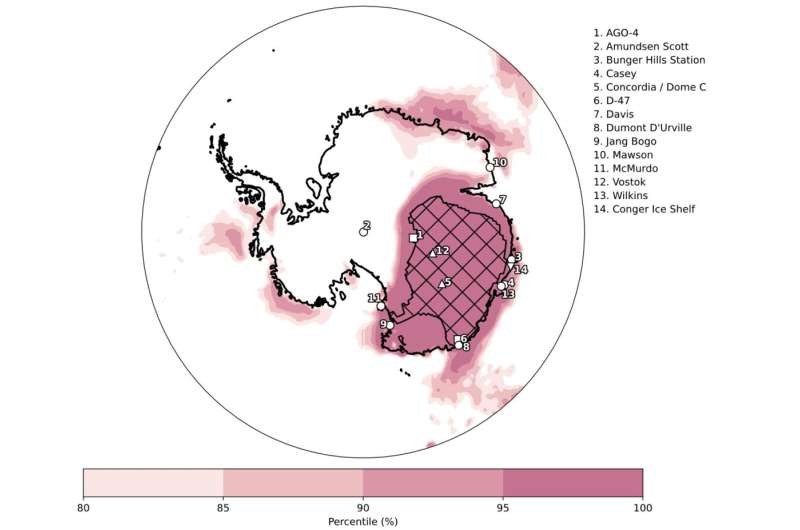This article has been reviewed according to Science X's editorial process and policies. Editors have highlighted the following attributes while ensuring the content's credibility:
fact-checked
peer-reviewed publication
trusted source
proofread
Extreme heat wave in East Antarctica driven by record-breaking 'atmospheric river,' analysis finds

Scientists have identified the intricate meteorological drivers that led to an intense heat wave across East Antarctica in from 15-19 March 2022. The heat wave, which affected an area of the size of India (3.3 million km2), was driven by the most intense 'atmospheric river' ever observed over East Antarctica.
A new analysis of this extreme event is the subject of two companion articles published in the Journal of Climate.
This record-shattering event set a new all-time high-temperature record of -9.4°C on 18 March near Concordia Station on the Antarctic Plateau in East Antarctica, with temperatures some 30°C—40°C above average. March is typically a transition month into Antarctic winter at Concordia Station, with daily average temperatures peaking at around -40°C –50°C.
The extreme temperatures were driven by an intense 'atmospheric river': a concentrated band of atmospheric water vapor transporting heat and moisture from the subtropics deep into the Antarctic interior.
Scientists found that convection and tropical cyclone activity in the Indian Ocean was a major source of moisture, which was then quickly transported to Antarctica thanks to an increased waviness in the jet stream that linked the low and high latitudes. This led to an atmospheric river intensifying near the coastline, reinforcing atmospheric blocking deep into East Antarctica and driving the tropical airmass deep into the Antarctic continent.
The atmospheric river intrusion led to thick cloud cover over the East Antarctic Plateau, trapping heat in the lower atmosphere. Mixed with scattered solar radiation, these conditions ultimately resulted in intense surface warming.
Dr. Tom Bracegirdle, co-author of the papers and Deputy Science Leader for the Atmosphere, Ice and Climate team at the British Antarctic Survey, said, "Across the globe, extreme temperature and weather events are breaking records by wide margins—and this event shows that Antarctica is not immune from this emerging trend."
This scale of the temperature anomaly would be considered a one-in-100-year event, but current climate projections suggest that extremes may increase in frequency.
The extreme event caused widespread surface melt along coastal areas and exacerbated a record low sea-ice extent. In addition, an extratropical cyclone west of the atmospheric river is thought to have triggered the final collapse of the Conger Ice Shelf, which was already critically unstable. However, very high levels of snowfall from this event also caused the overall mass of the Antarctic Ice Sheet to increase in 2022.
Bracegirdle added, "Extreme events are a key aspect of understanding how Earth's systems and frozen places will respond to global warming and on what timeline. It is critical that we improve our understanding of how climate change will influence the severity and frequency of extreme events in Antarctica."
More information: Jonathan D. Wille et al, The Extraordinary March 2022 East Antarctica "Heat" Wave. Part I: Observations and Meteorological Drivers, Journal of Climate (2023). DOI: 10.1175/JCLI-D-23-0175.1
Jonathan D. Wille et al, The Extraordinary March 2022 East Antarctica "Heat" Wave. Part II: Impacts on the Antarctic Ice Sheet, Journal of Climate (2023). DOI: 10.1175/JCLI-D-23-0176.1
Journal information: Journal of Climate
Provided by British Antarctic Survey




















